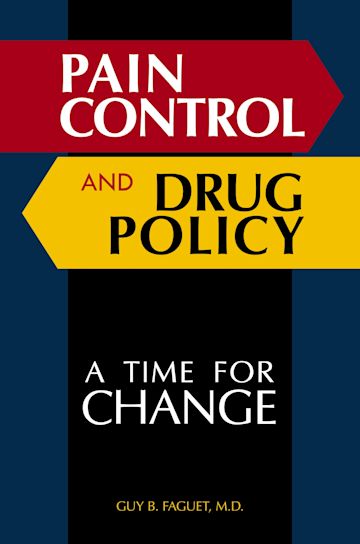This product is usually dispatched within 1 week
Free US delivery on orders $35 or over
You must sign in to add this item to your wishlist. Please sign in or create an account
This book offers an in indictment of the nation's drug enforcement approach focusing on the short-sighted policies that often deny patients suffering from chronic pain the medications they need.
Pain Control and Drug Policy: A Time for Change focuses on America's national crisis in pain management caused by the widening divergence between the enormous contributions of opioids ("narcotics") to pain management in the clinical setting and the mistaken belief that they are dangerous, highly addictive drugs. After dissecting the strategy and tactics of the War on Drugs from medical, historical, legal, socioeconomic, and geopolitical perspectives, Guy Faguet MD indicts the 40-year-long War on Drugs for having failed to stem the supply of illicit drugs in America despite expenditures of half a trillion dollars, despite violating the basic human right to pain relief of tens of millions of American chronic pain sufferers, and despite fomenting organized crime, government corruption, racial injustice, and social disruption in both the United States and the producer countries. He concludes with a clarion call for the abandonment of the War on Drugs, disbanding the Drug Enforcement Administration, and encouraging Congress to repeal the Controlled Substances Act.
As a clinical and research oncologist responsible for the chronic pain management of thousands of cancer patients over the course of his 30-year career, Dr. Faguet knows that the most effective and safest way to manage most cases of chronic pain is with opioids. All modern pain-management textbooks advocate "titration to effect" in cases where opioids help: that is, gradually increasing the dosage until either the pain is acceptably controlled or the side effects begin to outweigh the pain-relief benefits. Yet the vast majority of doctors don't practice what the medical textbooks teach and instead prescribe opioids very reluctantly and conservatively. As a result, only half of all chronic pain sufferers-and fewer than half of all cancer patients-get adequate pain relief from their doctors. Why do physicians radically undertreat pain that is susceptible to opioid analgesics? They fear that if they prescribe Schedule II opioids in accordance with the professional standards of pain management set by such medical bodies as the American Pain Society, they will be investigated by the DEA, stigmatized, prosecuted as criminals, stripped of their licenses, and sent to jail. Visit Guy B. Faguet, MD's website here: www.faguet.net.
| Published | Apr 15 2010 |
|---|---|
| Format | Hardback |
| Edition | 1st |
| Extent | 256 |
| ISBN | 9780313382802 |
| Imprint | Praeger |
| Illustrations | 16 bw illus |
| Dimensions | 9 x 6 inches |
| Publisher | Bloomsbury Publishing |
Free US delivery on orders $35 or over
Your School account is not valid for the United States site. You have been logged out of your account.
You are on the United States site. Would you like to go to the United States site?
Error message.

